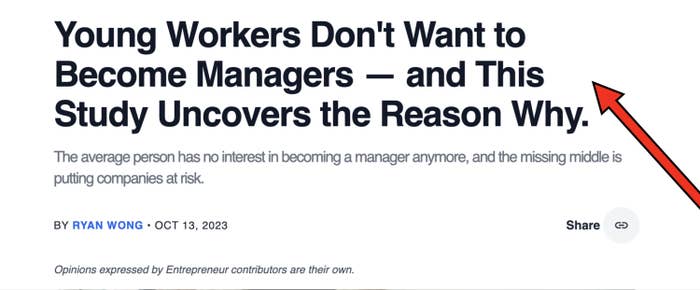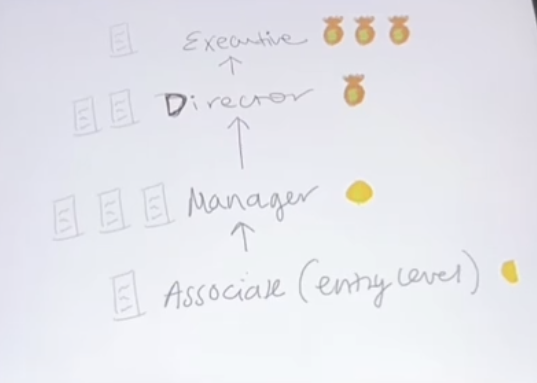Earlier this year, Entrepreneur shared the results of a survey revealing that only about 38% of staff at an unnamed company had goals of being a manager one day.

Seeing these numbers inspired conversations online where people began debating what the root cause is when considering why younger people are starting to get the ick when it comes to managerial positions. One voice that shone through was that of Kyyah Abdul, a 29-year-old regulatory affairs principal consultant who has seen her fair share of manager aversion.

To illustrate her point, Kyyah breaks out a drawing of the typical cycle: associate level to manager, manager to director, and director to executive with pay symbols beside them. "You start at the associate level, which is entry level, and you get paid half a doubloon," she says.
"You're not doing that much work, so you're like, 'You know what? This [pay] is not that bad. But I want to make more money, so let me see if I can advance in my career and become a manager.'"

"So you become a manager and you're like, 'Hold on... I only get a full doubloon despite doing three times the work I was previously doing as an associate?'"
"This is where people get to a point in their career where they're like, you know what, I'm going to take it on the chin, and continue to do this work because I know it's an internship opportunity to make it to the next level where I'm really going to start making the pirate's booty. I'm going to really start getting that lucky charms bag."
"I personally believe there are people out there who want to be managers and they want to progress up the ladder, but there's a standstill... People aren't able to move up the ladder because these people [meaning executives] aren't transitioning over to retirement. So I feel like there's a surplus of people who have been at this manager level for a really long time, and they're over it."
"And then they have younger people who are associates seeing how burnt out they are at a manger level and not being able to progress, so [associates] are like, 'Heck no, I'm not about to go through what [managers] went through, for only half a doubloon."
Looking back at the original study, Entrepreneur found that several factors Kyyah listed are correct. Largely, those surveyed felt that manager pay may be a little more than an associate's, but that bump in salary was not equal to the growing pressures and responsibilities that come with the role.
"Forty percent said their biggest worry with becoming a manager was increased stress, pressure, and hours. When we asked people to identify their top ambition, 67% said spending more time with their friends and families and 64% said being more physically and mentally. The lowest priorities were becoming a C-suite executive (4%) and becoming a people manager (9%)," Entrepreneur writes.
Similar sentiments were echoed throughout the comment section. One employee said, "I see what my manager does and never want to be a manager."

Becoming a manager is meant to be a promotion, but the bump oftentimes doesn't reflect this.

"[My] husband makes $10,000 less than his boss, and yet his boss's boss makes 146% more than his boss," someone shared.
!["[My] husband makes $10,000 less than his boss and yet his boss' boss makes 146% more than his boss."](https://img.buzzfeed.com/buzzfeed-static/static/2024-01/12/19/asset/57c5822e5f53/sub-buzz-958-1705087323-1.jpg)
"The early levels of leadership are NOT worth it," another agreed. "Pennies more for a migraine every day."

And those who do make it into higher levels often remain for years and years and years.

"My director is 68 and wants to work for another 10 years," one commenter said under Kyyah's video. "My manager, mid-50s, wants to be a director but wants to retire in 10 years."

And even when workers do climb the first rungs of the ladder, learn the skills, get the education, and develop the relationships needed to exceed in director and executive positions, that does not always guarantee them the role. In this person's experience, "They hire someone from the outside who is already at the exec level."

Or leadership hires a friend of a friend, or a kid of a friend, or literally anyone else they know — which leaves employees feeling jaded. "The people on top all know each other and stay there," one commenter wrote. "It's not what you know, it's who you know. The work means nothing."

When considering how to even out the playing field, one suggestion made its way to the top of the most-hearted comments, saying, "Rotating CEOs need to become a thing."

When speaking to BuzzFeed about her own thoughts on a way forward, Kyyah said, "More money or more restricted stock units for publicly traded companies. If I were given RSUs for each direct report or after each direct report met each of their individual goals, I would be more enticed, and I think others might, too."
"I also think some companies do not have a clear pathway for growth. Okay, you become a manager, and then what? What benchmarks do I need to hit to get to the next level? Companies always say vision is important when it comes to company goals. Well I think they need to give a clear vision for young workers to want to pursue becoming a manager."
What are your thoughts on younger generations avoiding managerial roles? Let us know in the comments.
If you'd like to hear more from Kyyah, you can follow her on TikTok.
